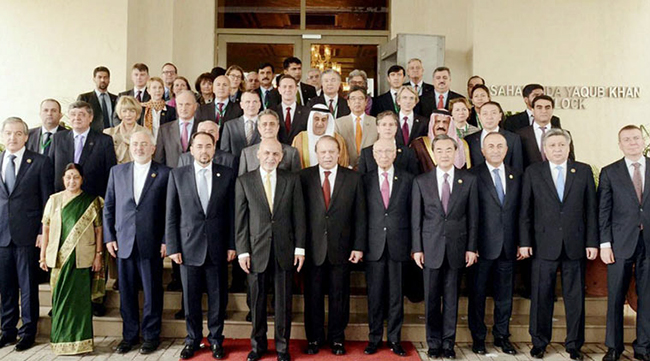The Heart of Asia Conference (HoA) was formed in Istanbul, Turkey, on November 02, 2011, providing a platform for regional cooperation in the heart of Asia by placing Afghanistan in its centre. This platform engages HoA countries in sincere and result-oriented cooperation for a peaceful and stable Afghanistan besides ensuring security and prosperity in the whole region. The HoA was formed to provide a platform for regional cooperation by placing Afghanistan in its centre. This platform engages HoA countries in sincere and result-oriented cooperation for a peaceful and stable Afghanistan besides ensuring security and prosperity in the whole region.
The Heart of Asia Conference is to provide a platform to discuss regional issues, particularly encouraging security, political, and economic cooperation among Afghanistan and its neighbors.
The united state and over 20 other nations and organizations serves as “supporting nation” to the process. The last (5th) Heart of Asia - Istanbul Ministerial Process was held in Islamabad, Pakistan on December 9, 2015. It was co-chaired by Mr. Salahuddin Rabbani, Minister of Foreign Affairs of Afghanistan and Mr. Sartaj Aziz, Advisor to the Prime Minister of Pakistan on Foreign Affairs.
In continue the process, on Saturday December 03, 2016, the senior officials of all 14 countries, including India, China, Russia, Iran and Pakistan, and representatives of 17 supporting nations were deliberating on a vast range of issues facing the region including its complex security scenario and dealing with threat of terrorism, radicalization and extremism. However, Afghanistan will be on top of the agenda provides an appropriate platform for regional countries to discuss the regional problems, insecurity and terrorism. Issues like enhancing Afghanistan's connectivity with South and Central Asian countries to boost trade is being discussed at the senior officials' meeting which was co-chaired by India's Foreign Secretary S Jaishankar and Deputy Foreign Minister of Afghanistan Hikmat Khaleel Karzai. The meeting finalized the text for yesterday's Ministerial Conference and is also deliberating on its Declaration which will have substantial portion on terrorism. Being attended by nearly 40 countries in the conference it is expected to increase security in and around the Afghan region.
Pakistani Prime Minister's Foreign Affairs Advisor Sartaj Aziz is representing Pakistan at the Ministerial conference which will be jointly inaugurated by Indian Prime Minister Narendra Modi and Afghan President Muhammad Ashraf Ghani. The annual conference is taking place amid heightened tension between India and Pakistan and there was no clarity on an Indo-Pak bilateral meeting on the sidelines of the conclave.
Ahead of the conference, both India and Afghanistan had called terror emanating from certain country as the "greatest threat" to regional peace and stability, and both the countries are set to press hard for adopting the counter-terror framework at today's deliberations. India had emphasized that they would never accept continuing cross-border terrorism as the "new normal" in bilateral ties with Pakistan while making it clear that talks cannot take place in an atmosphere of "continued terror". At the senior officials' meeting, Afghanistan, which has also been facing increased attacks from terror groups, pushed for a regional counter-terror framework.
India and Pakistan held a formal bilateral dialogue in the last Heart of Asia conference and decided to take the momentum forward in subsequent summits. However, tension has escalated between the two from the start of this year after the Pathankot attack and ceasefire violations in July. The Uri attack and hundreds of ceasefire violations along the Line of Control have left the two neighbors on the edge. None of the parties have asked for a bilateral dialogue at the summit while the conference has already started.
It is said that President Ghani is supposed to hold discussions with the Indian prime minister and these discussions will be focused on joint cooperation which will cover all spheres. Also there are other opportunities for Afghanistan to hunt but considering the past summits, no significant impact has been witnessed yet.
Prior to the conference, Beijing has just raised the China-Pakistan Economic Corridor (CPEC) by linking Afghanistan, the gateway to Central Asia, to the corridor. Quetta and Peshawar, two major cities would be linked to Kandahar and Jalalabad through railways in the first phase. The railway track would connect Kabul in the second phase. According to official sources the proposal was made by the Chinese Assistant Minister of Foreign Affairs Kong Xuanyou in a meeting with President Ashraf Ghani. The Chinese deputy minister stressed on importance of Afghanistan to China’s “One Road, One Belt” initiative. He suggested that Kabul, Beijing and Islamabad should engage in constructive talks about the proposed new trade corridors through building of railroads. The Afghan president reiterated that his country wants to have friendly relations with all neighboring countries. Earlier media reports suggested that Pakistan with support of China would build a railway track from Peshawar to Jalalabad.
The Afghan government has decided in May 2015 to launch survey of the Jalalabad-Peshawar railway track. Ministry of Public Works will work with a private company to complete the survey of 75 kilometer track. The railroad is 150 km long but only 75 km pass through Nangarhar province. PKR 60 million has been allocated for the survey which will take eight months. Pakistan is financing the project. Emphasizing on importance of the railway track project, Deputy Minister of Commerce and Industries Muzamil Shinwari said at that time that the two countries should complete the project on time. On the other hand, most of Afghan economists are of the view that the proposed railway links between Afghanistan and Project would benefit Beijing and Islamabad more than Kabul.
Home » Opinion » Heart of Asia Conference
Heart of Asia Conference
| Mohammad Zahir Akbari

